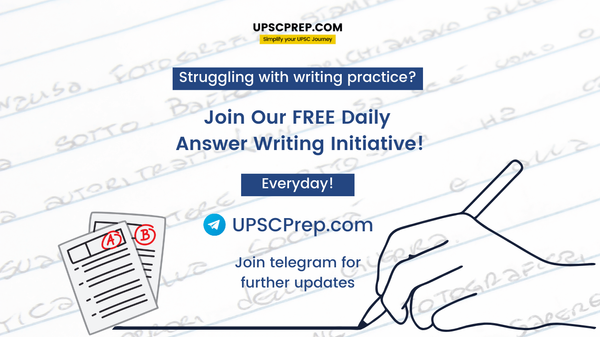Subject: GS 4
Syllabus: Case Study
Questions
- You are a district magistrate of a district infamous for girl child marriages. A contributory scheme was introduced by the government, for girl children aged 0-8 years. Total sum can be withdrawn only when the girl who is also unmarried turns 18. It is evident that all girls are married upon turning 18 and dowry incidents have increased substantially because late marriage means more dowry.
Also, parents now save more because of the scheme rather than investing on girl education. As the administration tries to tackle this problem, it looks up to you for ideas and leadership.
a. Identify the factors leading to such outcomes.
b. Devise a strategy keeping in mind multiple aspects of the situation.
(250 Words, 20 Marks) - In recent times, social media has emerged as an important platform for all to share their information and opinions. Many civil servants are also quite active on social media. Given this situation, there have been calls to revise or update the Civil Services Conduct Rules. Suppose you are a senior IAS officer who is heading a panel set up by the government to bring suitable changes in the conduct rules. Elaborate on how you will respond to the following questions:
a. What are the issues with a civil servant expressing his/her views on social media on various matters?
b. Should criticism of government policies on social media by civil servants be allowed?
c. How should civil servants conduct themselves on social media?
(250 Words, 20 Marks)
Download Model Structures PDF
Model Structures
Q1. You are a district magistrate of a district infamous for girl child marriages. A contributory scheme was introduced by the government, for girl children aged 0-8 years. Total sum can be withdrawn only when the girl who is also unmarried turns 18. It is evident that all girls are married upon turning 18 and dowry incidents have increased substantially because late marriage means more dowry.
Also, parents now save more because of the scheme rather than investing on girl education. As the administration tries to tackle this problem, it looks up to you for ideas and leadership.
a. Identify the factors leading to such outcomes.
b. Devise a strategy keeping in mind multiple aspects of the situation.
(250 words)
Introduction
- This case study shows how a well intentioned scheme can lead to unintended consequences. Stakeholders include young girls, their parents, government, soon-to-be husbands and their families, and society at large.
Main body
- The letter of the scheme was upheld but spirit was not. This can be due to factors like-
- Scheme was short on components needed to bring change in the thought process of the given community.
- There was no section for educational, financial and social empowerment of girls.
- Dowry discouragement was not part of the scheme i.e the means to achieve an end were not holistic.
- Focus was simply on increasing the age of marriage.
- Sensitivity of the given community towards the marriage age of girls was overlooked.
- All the above mentioned issues can be overcome by few tweaks in scheme like-
- Only a specific amount, say 75%, will be released on the girl turning 18 if the purpose is anything but higher education.
- Incentive of say 25% if amount withdrawn after 21 years of age, and graduation is completed.
- Strategy to bring change in community’s mindset-
- Invitation to women civil servants and leaders to speak at various forums and at various levels.
- Yearly rewards for women achievers at state level.
- Public campaigns about women empowerment going beyond traditional roles to that of decision makers.
- Scholarship for higher education.
- Vocational skill development of girls.
- Strict implementation of anti dowry laws and incentivize those who report dowry cases,
Conclusion
- The larger picture involves embedding gender equality and increasing enrollment ratio at all levels. Short term steps will help address symptoms and long term will make the progress sustainable.
Q2. In recent times, social media has emerged as an important platform for all to share their information and opinions. Many civil servants are also quite active on social media. Given this situation, there have been calls to revise or update the Civil Services Conduct Rules. Suppose you are a senior IAS officer who is heading a panel set up by the government to bring suitable changes in the conduct rules. Elaborate on how you will respond to the following questions:
a. What are the issues with a civil servant expressing his/her views on social media on various matters?
b. Should criticism of government policies on social media by civil servants be allowed?
c. How should civil servants conduct themselves on social media? (250 Words)
Introduction:
- The above case-study is related to conflict between the fundamental right that guarantees Freedom of Speech to every citizen and Rules 8 and 9 of Central Civil Services (Conduct) Rules, 1964 which limit the right of speech of a civil servant. With the rising popularity and use of social media, such debates are more highlighted.
Main Body:
- Issues with a civil servant expressing his/her views on social media on various matters
- According to the Civil Services Conduct Rules, civil servants are expected to maintain a high level of probity in public life.
- They cannot share their views and opinions on the public platforms.
- Divulging professional confidential information: Social media opens up a ‘pandora’s box’ where anyone can ask, troll and instigate the officer about a situation.
- In the absence of limitation over freedom of speech, the officer can divulge confidential information in the heat of the moment.
- Undermining the government: criticizing a public policy or government’s initiatives at a public platform may embarrass the government of the day.
- It can affect the trust it has among people.
- It also brings political neutrality of the civil servant into question.
- Increasing conflict between center and state and among nations: Being a part of policy making, the bureaucrats have prior as well as inside information about policies to come.
- A free expression about their views on key policies and issues in public takes away the option of diplomatically handling issues.
- This may also increase conflict among center and states and even jeopardize international relations.
- According to the Civil Services Conduct Rules, civil servants are expected to maintain a high level of probity in public life.
- Criticism of government policies on social media by civil servants
- Central Civil Services (Conduct) Rules ensure that officers do not criticize recent government policy or action, and remain politically neutral.
- Arguments in favor of free speech of civil servants:
- According to the conduct rules, action can be taken against any conduct, which is seen as ‘unbecoming’.
- This becomes highly subjective as the law does not define what exactly constitutes ‘unbecoming’ conduct.
- The rules are very tough and the threat of disciplinary action is not limited to the expression through written word.
- It includes caricature that are uncharitable to the government too.
- According to the conduct rules, action can be taken against any conduct, which is seen as ‘unbecoming’.
- Arguments against criticism of government policies by civil servants
- Damage the credibility of the government and its public image.
- Freedom of Speech guaranteed under Article 19 is not an absolute right and can be curtailed in the larger national interest.
- These restrictions are not unique to India and can also be seen in countries like the UK, USA, Australia etc.
- The Kerala HC said in a 2018 judgment that, “Discipline and servitude are to be distinguished. If an employee speaks out in social media in a general perspective, which is not inconsistent with the collective interest of the Institution, that is part of his right of free speech. No authority should expect one to be silent. However, when the rights of an individual become repugnant to the collective interests of the institution, the individual must fall within the lines of collective interests.”
- Civil servants conduct themselves on social media
- Civil servants must recognize the difference between-
- Being a citizen expressing his/her personal opinions.
- Being a public intellectual dispensing policy information and the job description of a civil servant.
- Civil servants should try to avoid negative criticism of the government initiatives in the first place itself and should act responsibly while being in the public sphere.
- They should follow self-regulation while using social media platforms.
- A civil servant should keep out of partisan politics and should remain away from the limelight by following the principle of anonymity.
- A serving civil servant wants to express an opinion that runs contrary to this, then the proper thing to do is resign from office first.
- Civil servants must recognize the difference between-
Conclusion:
- The survival of public institutions depends upon how it accounts for democratic values and freedom of speech is a cornerstone of democratic value. Therefore, the conduct rules should be flexible enough to accommodate certain kinds of expression and should not be misused to restrict the constructive criticism by the civil servants which may not necessarily be political in nature.
- Appropriate internal and institutional mechanisms must be utilized to channel any critical views. However, the criticism should also be in consonance with the principles enshrined in the Civil Services (Conduct) Rules and the Constitution of India and must not be influenced with personal bias.

Write UnLimited Course (1 Year)
Write answers from any source, we will evaluate them for you.
